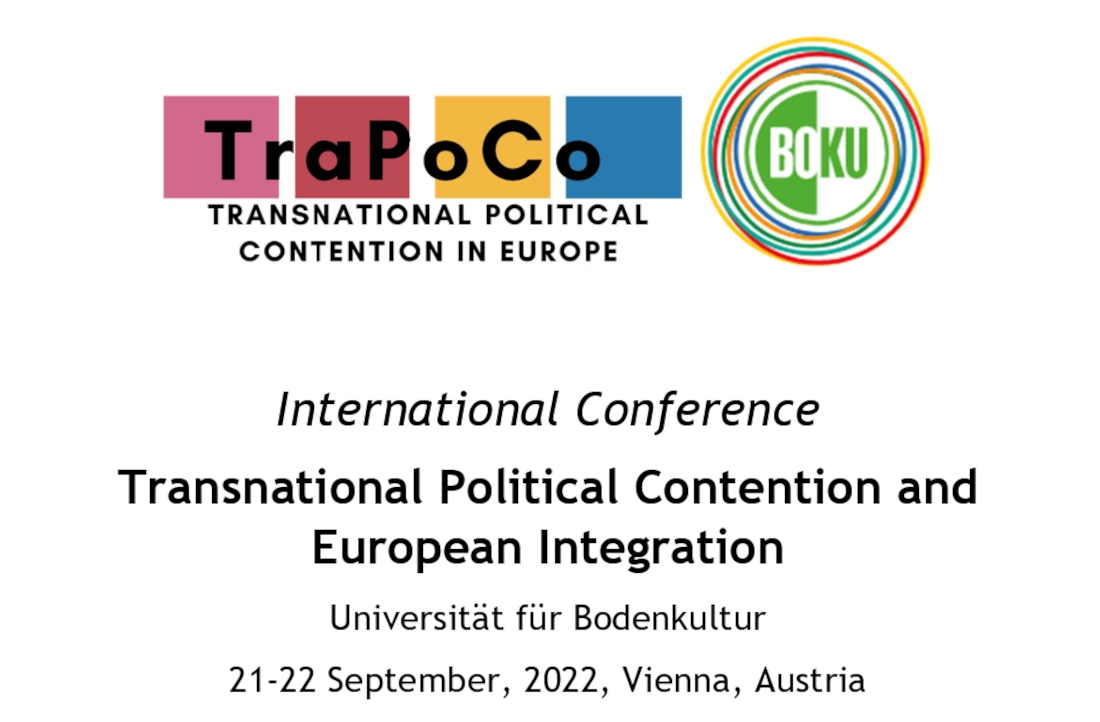About the Transnational Political Contention in Europe (TraPoCo) project
Transnational Political Contention in Europe (TraPoCo) is a three-year project (2020-2023) set up within the “Jean Monnet Network” action of the Erasmus Plus programme that aims to promote awareness, innovate the teaching activity, and encourage dialogue between academe and civil society on the studies relating to European integration.
The Scuola Normale – with the academic co-ordination of Donatella Della Porta – is the leader of the TraPoCo project, an international network of universities, think tanks and associations bringing together scholars from different disciplinary areas –from sociology to law and European studies– and from various countries – Italy, Spain, Belgium, Ireland, Austria and Serbia – aiming to examine in-depth the role of such social actors as movements, non-government organisations, activists and trade unions in the detailed study of the area of rights and democracy in Europe.
In addition to the Normale, the partners of the project are the following: Osservatorio Balcani Caucaso Transeuropa – Trento; Univerzitet u Beogradu (Institute of Sociology and Social Research); University College Dublin (School of Politics and International Relations and UCD College of Business); Universität für Bodenkultur Wien (Institute of Forest, Environmental, and Natural Resources Policy); The Good Lobby – Bilbao/Brussels; University of Trento (associated partner).
September 21, 2022
Location: Gregor-Mendel-Haus, Festsaal, Floor 3
16.30-17.00 Arrivals & Registration
17.00-18.30 Panel 1: Visions of Europe
Chair: Donatella della Porta (Scuola Normale Superiore Pisa)
Adam Fagan (Kings College London) & Stijn van Kessel (Queen Mary London) – Defending the status quo: the dilemmas of pro-European activism in Germany and the UK
Alvaro Oleart (University of Maastricht)/Manès Weisskircher (University of Oslo) – How (not) to impact EU politics from below? The gains and losses of DiEM25
Luisa Chiodi (BalcaniCaucaso, Trento) -Horizontal and vertical transnationalism: the Italian civil society and the challenges of contention in the EU space
Aron Buzogány/Patrick Scherhaufer (BOKU Vienna) – The New Climate Movement and the EU
18.30-19.00 Coffee and Tea Break
19.00–20.00 KEYNOTE
Donatella della Porta (Scuola Normale Superiore Pisa)
Paths of transnationalization in social movements
Followed by drinks reception and dinner for conference participants (place to be announced)
September 22, 2022
Location: Gregor-Mendel-Haus, Hörsaal IV, MENH-02/08
09.00-10.30 Panel 2: Civil society and the authoritarian challenge in Europe
Chair: Dorit Geva (CEU)
Manuela Caiani (Scuola Normale Superiore Pisa)/Manès Weisskircher (Oslo University) – Anti-Nationalist Europeans and Pro-European Nativists on the Streets: Visions of Europe from the Left to the Far Right (and transnational practices)
Attila Antal (ELTE Budapest) – The Extraordinary Measures of Authoritarian Populism and the “European State of Exception” controlled by the Civil Society
Damla Keşkekci (SNS Pisa) – How Transnational or Transnational How? Far-Right Mobilization in Western Europe (2017 – 2021)
Kavyanjali Kaushik (University Carlos III Madrid) – Digital Networks of Nationalism: Understanding Radical-right Party and Movement Success in Europe
Máté Szabó (ELTE Budapest) – Under Pressure grows the Palm? Civic engagement and civil society deformed under the pressure of the Orbán-regime in Hungary (2010-2022)
10.30-11.00 Coffee and Tea Break
11.00-12.30 Panel 3: Transnational labour struggles
Chair: tba
Imre G. Szabó (University College Dublin/CEU) – Unlikely actors for transnational mobilization? The politicization of public services by trade unions across Europe
Franziska Laudenbach, Philipp Gies, Marcus Franke (University of Bremen) – The renaissance of sectoral social dialogues. Did the Covid-19 pandemic serve as an amplifier of transnational workers solidarity at the level of sectoral social dialogues?
Roland Erne (University College Dublin) & Joerg Nowak (Universidade de Brasilia) – What factors are driving the increasing number of transnational labour protests in Europe (1997-2019)?
Darragh Golden & Roland Erne (University College Dublin) – Ryanair pilots. Unlikely pioneers of transnational collective action
12.30-13.30 Lunch Break
13.30-15.00 Panel 4: Narrating Europe from the margins
Chair: Daniela Apaydin (IDM Vienna)
Jelisaveta Vukelić & Jelena Pešić (University of Belgrade) – Transnationalisation vs. Green Nationalism: Discursive Framing of Recent Environmental Struggles in Serbia
Nikos Papakostas (Inter alia NGO) – EU Funding Frameworks and the Role of Civil Society as an Agent of Social Transformation
Nicolas Moll (Independent researcher) “Europe dies or is reborn in Sarajevo” – The international protest and solidarity mobilisations during the 1992-1995 war in Bosnia and Herzegovina and the attempts to build ‘another Europe’
Laura Luciani (Ghent University) Re-politicising Human Rights – ‘Promotion’: EU Interventions and Civil Society Agency in the South Caucasus
15.00-15.30 Coffee and Tea Break
15.30-17.00 Panel 5: Migration and transnational solidarity
Chair: Luisa Chiodi (BalcaniCaucaso Trento)
Chiara Milan (SNS Pisa) /Chiara Martini (University of Ca’ Foscari Venice) – Why to engage in solidarity movements? The meaning of engagement and the new imaginaries of solidarity activists
Sinem Bal (Independent researcher) – Eroded transnational women solidarity? Migrant women stuck in between the EU – Turkey
Francesca Fortarezza (SNS Pisa) -Contesting EU policies at the borders: transnational solidarity across the Balkan Route
Federico Alagna (SNS Pisa) – Migration activism and ‘municipal militancy’ in the EU: A multi-scale perspective
17.00-17.15 Coffee and Tea Break
17.15-17.45 Conclusion/Final Discussion
Donatella della Porta
Chiara Milan
Aron Buzogány
Registration to the event is free but places might be limited. To attend, please register through our registration system .
INFO:






